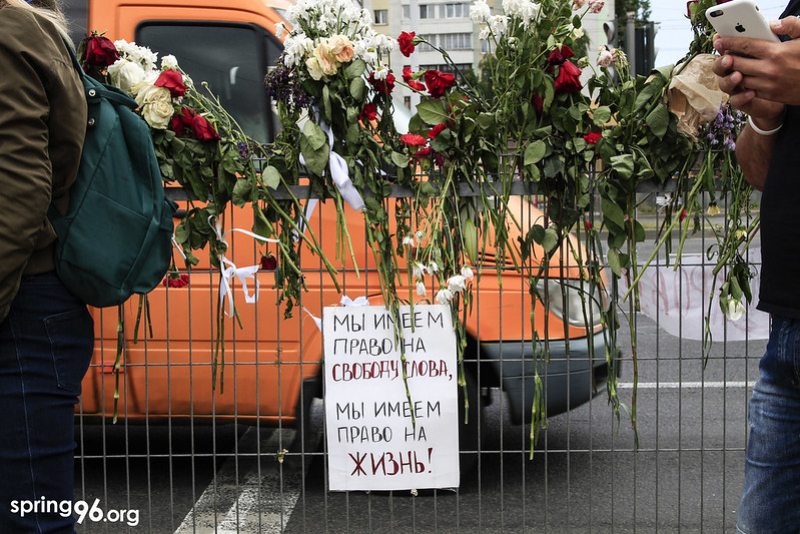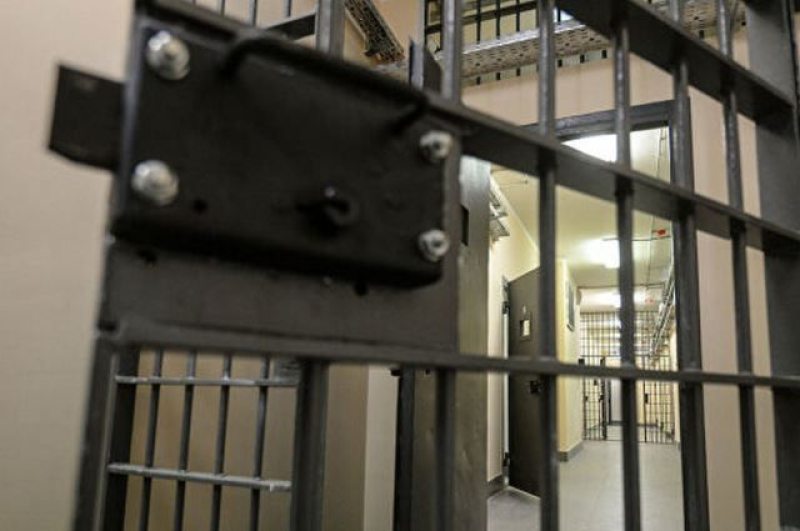"I knew that sooner or later they would come for me": a confession of a former political prisoner
Mikalai, a former political prisoner from Minsk (his real name is not indicated for the safety of his relatives), after administrative trials and two and a half years of imprisonment, recently managed to leave Belarus. The idea of leaving the country came to his mind during his first arrest at Akrescina. He agreed to speak about his participation in the events of 2020 and about the persecution he experienced from the time of his detention to the moment of his release.
A brain injury for a photo of the riot police
"It all started on August 9, 2020," says Mikalai. "That day I went to my polling station, voted, made a post, and then things became rough. I went to the city centre in the evening and saw it all with my own eyes, and it really hit me. I started taking part in marches and rallies, but then God saved me and I wasn't detained.
I remember a situation on the second day after the death of Aliaksandr Taraikouski. I was driving from home to the office through Puškinskaja and there, at the traffic light near the spontaneous memorial, I honked along with other drivers. And next to me was some Lukashenka supporter with a red-green flag, who overtook me and began to cut me up and brake sharply. He was creating conditions for an accident, in short. And then, when I overtook him, he crashed into my car from behind. I already knew how motorcyclists were detained and beaten. So I decided not to deal with him and left. Later, I was issued a large fine for this and ordered to pay for the insurance to the provocateur."

- Flowers at the scene of the murder of Aliaksandr Taraikouski. "We have the right to the freedom of speech, we have the right to live!"
On October 12, 2020, Mikalai's car was stopped by riot police, then he was severely beaten and taken to a police station. And that was just because he took a photo on his phone:
"When the March of Senior Citizens was taking place, I was driving along Prytyckaha street and saw a group of riot police, 15-20 people, at a bus stop. I took a picture of them and drove on. But at the next traffic light, they caught up with me in two cars, jumped out, grabbed me, brutally beat me, damaged my car, and took my phone and documents. Then they took me to a police department, where they interrogated me all night. I lost consciousness several times. I was vomiting. Then it turned out that I had a brain injury. The riot police wanted to take me to Akrescina, but I lost consciousness again. Then they called an ambulance and took me to a trauma center. A police officer was guarding me there, but I took advantage of the moment when no one was there and escaped from the hospital. I was left alone for a while." says the interlocutor.
A few months later, in February 2021, Mikalai returned home late at night after work, but did not have time to park properly, as two cars drove up, and unknown people got out of them and demanded Mikalai to drive with them:
"They showed me their IDs in the dark and took me to the Frunzenski Police Department. I thought in surprise: 'Why there? It's not my neighborhood'.
There they began to draw up reports, where they indicated that I was waving my arms and using obscene language near... the Frunzenski Police Department. They took me to Akrescina. There I was on a dry hunger strike for four days. When 72 hours had passed since my detention, they took me back to the police department. They didn't explain anything for two hours, and then they took me back to Akrescina. They showed me the reports on the way. This time I was detained allegedly in a drunken state somewhere on Čyhladze street. Of course, there was no medical examination, and the next day there was a trial via Skype. I had a lawyer who helped me: he drew the court's attention to various inconsistencies, to the need to consider the video from the surveillance camera. The case was postponed until Monday. Four reports were considered at the trial. The judge discarded two reports. But the one under Article 23.34 of the Administrative Code remained. I was advised to admit guilt and maybe that's why I just got a fine."
"They detained me as if I were Osama bin Laden"
Mikalai went to a friend's farm for a couple of months, and then, when everything calmed down a little, he moved to live in a quiet village, trying not to show up too much on social media.
"I knew that sooner or later they would come for me. And that's what happened. They arrived to the village a year later: several cars, riot police in full gear with machine guns, and they even launched a quadcopter. They detained me as if I were Osama bin Laden", he recalls.
At first, Mikalai was placed in the temporary detention facility of the Minsk district for 10 days, then he was sentenced to another 10 days at Akrescina for petty hooliganism: allegedly he waved his arms on the territory of the Baraŭliany village council.
"I could never imagine that 10 people could fit on five square metres on a concrete floor and sleep like this for ten nights in a row. I couldn't even think that you can use the toilet in a room with a lot of people, covered with just a sheet," says Mikalai.

- Illustrative photo
Then the prisoner was transferred to Valadarka, where he spent seven months in a cell where 19 people were awaiting trial, and then they began to vacate places (it was then that the trials of Viasna activists and other famous people began) and he was transported to Mahilioŭ. Here Mikalai waited for the trial for two more months. Thus, he served 11 months before his trial.
Mikalai was charged for participating in protests under Part 1 of Article 342 of the Criminal Code, and a little later, when investigators studied his posts on social media, they added Article 130 (inciting social hatred). The investigators conducted a linguistic examination, which did not find anything seditious in his words, and then they did a psychological and linguistic examination for almost two months. In May, a trial was held, and the man was sentenced to two years and six months of imprisonment. He was sent to Vitsba in the middle of June, at first it was calm, and after a while he was punished by a punitive isolation cell (SHIZO), and later he was also placed in a cell-type space (PKT):
"Once in a conversation, I spoke emotionally on a political topic, and immediately someone turned me in to the administration. Once, an employee of the security department flipped through my notebook, where I left my short thoughts, some quotes from books I had read, and noticed a small piece of paper which said: 'The head of the squad is a fucker.' That's how it all began. I spent more than six months in total in SHIZO and PKT.
The total lack of justice generated an inner protest in me. No matter how much I tried to control myself, sometimes the protest broke through. Everyone in the penal colony is scared. Political prisoners are constantly harassed, thrown into a punishment cell for any little thing. Sometimes it was unbearable to endure all this. Physically, it was still possible to tolerate all this, but psychologically it was much more difficult. It feels like rape, when a person is raped and can't do anything about it."
The decision to leave Belarus came to him immediately, back at Akrescina in 2022:
"All the time I had an idea that if a miracle happened and I got out, then I would immediately get out of there. After all, there's nothing you can do in prison, but at least I can do some good once I'm free."

















